#Equine (Horse) Vet Medicines
Text


Patreon
#studyblr#notes#my notes#animal science#equine science#equines#horses#animal sci#science#biology#bio#vetblr#veterinary science#vet sci#vetsci#vet science#vetmed#veterinary medicine#vet med#vet medicine#horse biology#horse breeds#breeds of horses#domestication#biology of horses#life science#biological science#note cards#flashcards#flash cards
5 notes
·
View notes
Text
Today in Vet School:
"They were designed to run really really fast until a wolf or a sabertooth tiger or something eats them...or eats their slower friend. Then they go back to eating."
~Equine Professor regarding the evolution of the horse
12 notes
·
View notes
Text
I hate learning about horses so fuckin much bruh
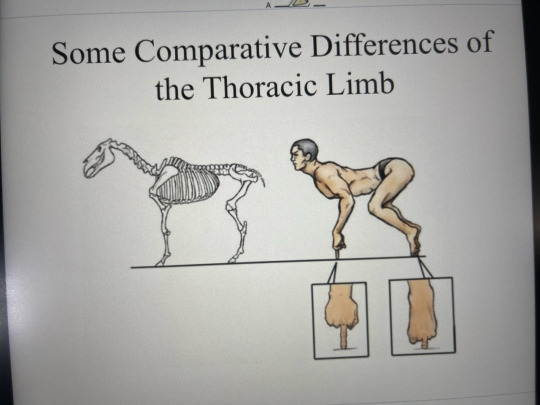

Horses were God’s biggest mistake
#and they are constantly injuring themselves for no reason??? and for what??#I can’t#vet school stuff#rantings of a future dogtor#equine medicine#btw I’m joking I like horses they just confuse and worry me
19 notes
·
View notes
Text
Today at the horspital there were a lot of horses trying to unalive themselves. It’s uncommon for us to have a day with 0 emergency calls but today was a rare high for this time of year. One died of a tummy ache on the table in the AM, and two more were on their way in when I clocked out. It’s always a gamble on if emergency=euthanasia but that’s just business.
For those interested in a morbid round of play along at home, vote below for which, if either, of the two emergencies arriving at the horspital this evening make it out alive based on the symptoms I was given over the phone.
#prediction#survey#veterinary medicine#horses#horse anatomy#tw vet#tw animal illness#tw animal injury#tw animal death#tw animal dying#tw animal harm#tw animal sickness#equine#equestrainlife#horseblr#polls#tumblr polls#poll
2 notes
·
View notes
Text
Week one as a practicing equine veterinarian has been a blast. One heck of a nap was required this weekend, but I'd call it a fabulous start!
#veterinary medicine#vetblr#veterinarian#horse#equine vet#vetmed#the two month old warmblood colt trying to kill us was a surprise tho
5 notes
·
View notes
Text
went out of state today to assist in an equine inguinal hernia repair surgery !!! so freaking cool. i got to place a jugular catheter on a horse!!!!!!!
2 notes
·
View notes
Note
is the horses eat birds thing true? What are other weird things about horses we don’t know every fact I learn about them is weird
Like many other herbivores, horses are not as strict about the “only plants” thing as you might think. Though it’s exceedingly rare (but not unheard of) for horses to purposefully hunt and kill birds, they’re not above opportunistically munching on a little bird here and there if it gets in the way of grazing. Calories are calories!
There are so many weird things about horses. My favorites are going to be related to anatomy and physiology because equine medicine is crazy. Here are my top picks
- Horses (like rabbits) are obligate nasal breathers and cannot breathe through their mouth. This means a super congested nose can kill them, and nasal surgery on horses is really scary because post op swelling can become fatal if you’re not careful
- Horses have a callus thing about halfway up the leg called a chestnut or night eye (everything in horse anatomy has several weird names like that). This callus is believed to be a vestigial toe
-Horses have a structure called the guttural pouch that is basically paired sacs of air nestled inside the head likely to help with thermoregulation. Only problem is that pretty much every vital structure in the head (veins, arteries, nerves) pass through these sacs, so if something like a fungal infection gets in there it can cause huge problems very quickly
- Every vet student hates the word laminitis. This is a condition involving inflammation of the inner parts of the hoof and if it gets bad enough the hoof actually starts to detach from the bone. Laminitis can be caused by everything from retained placenta to eating particularly lush grass. That’s right- if you allow your horse to feast on a pasture too green, it’s feet might start falling apart 🙃
Despite their rep as horribly designed animals I actually love horses and find their physiology fascinating. Any animal that has evolved to do one specific thing really, really well (in their case running) will have some little quirks of their biology as a result.
863 notes
·
View notes
Text
Sometimes I think about how when I was a little kid, I got an advertisement in the mail from HSUS asking people to write their state congresspeople about banning horse slaughter in the United States. Had a beautiful picture of a horse running wild and free on the envelope and provided a template to follow.
Little me wrote my representative, and I even got a response assuring me that they would support the bill. It ended up passing, and yay we saved the horsies!
Then I grew up and got a job in vet medicine, and was told by an experienced equine vet how because of that bill, horses whose owners either can’t or won’t have them euthanized will be sold to slaughter operations in Canada or Mexico, necessitating them to be transported sometimes hundreds of miles by trailer instead of being granted a swift, merciful death—which they often desperately need. One they would have if humane slaughter of horses was still legal in the United States.
So when I think about the HSUS backing the SWIMS Act, I get scared. Because somewhere out there, there’s going to be a sweet little kid who just loves animals writing their representative, asking them to save the whales. Without realizing they’re only making things worse.
#not saying they only supported the bill because of me btw… they were already going to vote for it#swims act#humane society of the united states#animal welfare
110 notes
·
View notes
Text
So you want to write about horses.
(Part 3! Enjoy this post? Want to know more? Check out So You Want To Write About Horses Part 1 and So You Want To Write About Horses: Medieval Edition)
Maybe your character is a jockey, or a rancher, or a stablehand, or the ever popular cowboy in the wild west. Maybe they have a whole team and an Olympic dream. But what do people even do with horses? I can help.
First, some vital terms
The equipment that a horse wears is referred to as Tack. Tack can be minimal or incredibly complex. The part that goes on the horse's head when riding is the bridle, and the part that goes on the back for the person to sit on is the saddle.
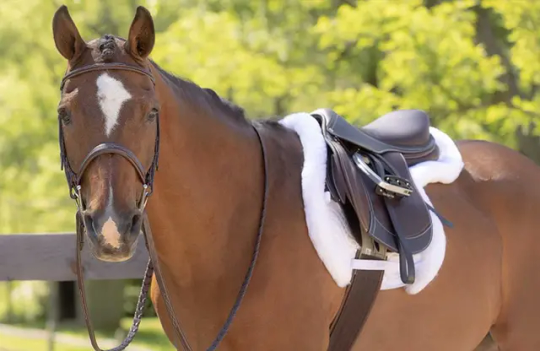
^ Got that? Good, there will be a test at the end.
Now, What do people even do with horses?
To know the jobs around horses, you should know that the equestrian world is divided into very distinct and separate realms, and the further you delve into these realms, the more specific and specialized the horses, equipment, and terms become. Broadly, there is "pleasure" horses and "working" horses. Working horses are relied upon for physical labor to support their humans. Pleasure horses fall into more of a hobby for their humans.
There is also the Western riding style and the English riding style. The Western style descends from the Spanish saddle, and is used throughout the world, but most commonly in the Americas, where it is closely tied to herding cattle. The English style is a bit harder to clearly pin down the original influences, but has history in military uses throughout the European continent, and currently exists internationally. The English style is the style used at the Olympic games and in jumping competitions, whereas Western is not.
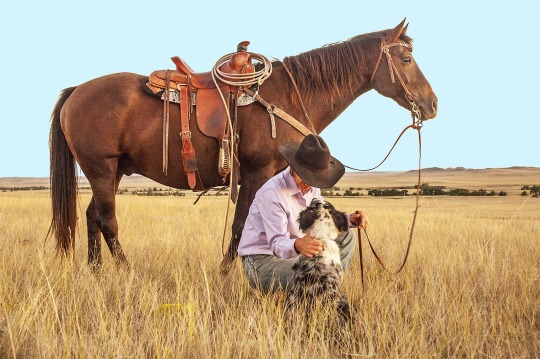
^ this is an example of a Western Style working horse. Western describes the style of equipment as well as the riding style. This horse is dressed for herding cattle, with a large comfortable saddle and simple rope bridle.
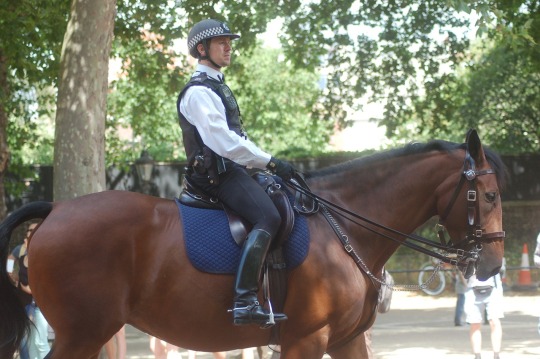
^ This is also a working horse, this time in the English riding style. Notice the saddle is much smaller, without a large 'horn' at the front of the saddle, and the bridle on the horse's head is much more complex. This horse is a Police horse.
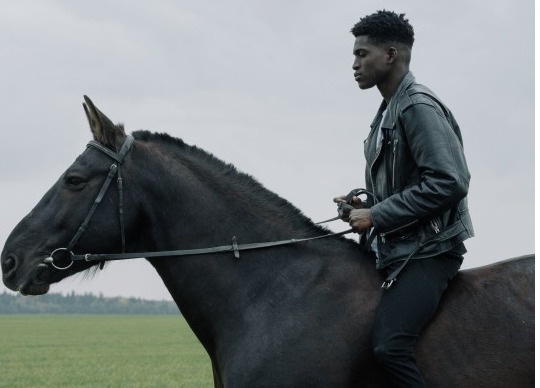
^ and there are many combinations, variations, or lack ofs that exist. Some people have trained their horses to not need any tack, and need only the tiniest movements of their rider's body. Don't ask me how, I am not one of them.
Finally, Professions involving horses.
For ease of understanding, I will break this into segments that involve all horses, English horses, Western horses, and then the even more specific horses like racehorses, ect.
This edition will deal with professions involving All Horses.
Equine Veterinarians
Veterinarians that work with horses in rural areas are usually more generally large animal veterinarians, while equine vets, often attached to an equine hospital or clinic, have specific and in-depth knowledge of equine medicine, rather than equine and bovine medicine. Both large animal vets and equine vets administer vaccines, diagnostic tests, and certificates of health, as well as diagnosing and prescribing treatments of injuries and sicknesses. Vets also aid in breeding horses, caring for pregnant mares, birthing foals, and handling semen collection or injection for artificial insemination.
One of the most common reasons for a vet call is for the treatment of colic, any horse owner's nightmare. Horses have a massive system of intestines, and any change to a horse's diet, stress, or exercise, as well as many other causes, can lead to a backup of food or feces in the digestive system. Minor cases can resolve with pain treatment, but in severe cases surgery is required, and horses can die very quickly from what is essentially an extremely dangerous stomach ache. It is one of the most common causes of death for horses.
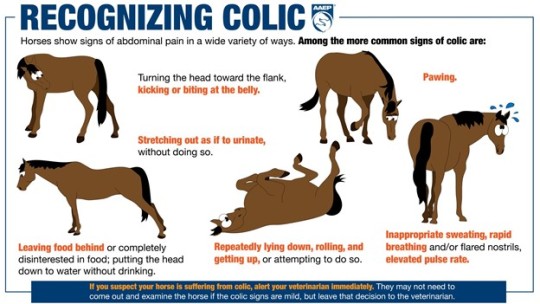
^ In very severe cases, parts of the intestine tie themselves into knots, lose blood flow, and die within the horse. I know many horses that have died from colic, and some that have survived.
Farriers
Farriers are pedicure specialists for horses. The hoof of a horse is simply a very large and thick fingernail, and a farrier is an expert in trimming, shaping, and even repairing that massive fingernail, as well as tacking on metal shoes to the bottom of a horse's foot. Farriers are also sometimes blacksmiths, and will create their own shoes, while others use premade shoes and nails.

^ (1)A farrier tacking on a shoe to a horse's hoof. (2) Shaping hooves with a rasp. Farrier treatments cause no pain to the horse when done correctly, and the specialized knowledge of which is why many farriers are expensive. Horses will need this redone every 4-8 weeks, depending on the horse and the environment. Even more than the vet, a good farrier is vital to the health and use of a horse, while a bad farrier can ruin a horse in less than the swing of a hammer.
(Side note: This is not a shoe, and no person putting that on a horse should be considered a farrier. I don't take many strong stances in informational posts, but this is one.)
Saddlers
These expert leather workers fit and shape the tack to the shape of the horse and the shape of the rider. Many serious riders have custom fitted tack, where a base saddle or bridle has been reworked after purchase to perfectly fit the riding pair in question. (I have one, it was expensive, and it continues to be worth it). Historically, tack has always been made with leather, which allows for stretch and molding of the tack, as well as decades of longevity, and still today, only the cheapest of tack is made with plastics. Saddlers often specialize in English or Western style tack, and many old brands are still known today for certain fits.
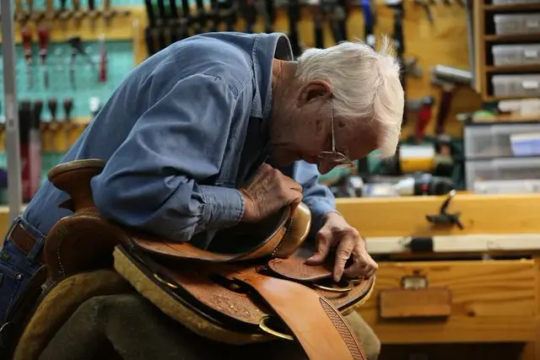
^ An expert Colorado saddler at work.
Trainers
Horses do not naturally trust humans, even after thousands of years of domestication, nor do they automatically know how to be ridden. Trainers are experts not only in their discipline, but also experts in horse behavior, communication (with humans and horses), basic first aid, common sense, and the rarest of all, the elusive 'horse sense'. Horse sense give a trainer the understanding of a horse's personality, and allows them to form a bond that not only teaches the horse to trust them, but to trust all humans. A trainer's job is to discover the horse's potential abilities, as well as the horse's fears, dislikes, and any pain or mis-training that could impede a horse's progress. Across the world, there are many style of training, many jobs that horses must be taught to preform, and a lot of misunderstandings. A good trainer can save the lives of horses and humans alike, a bad trainer can ruin both. The first steps of training a horse can be referred to as 'starting', 'breaking', 'training', 'backing', and many more.
Grooms
Grooms are the beauty professionals of the horse world, as well as the people getting everything done behind the scenes at high level barns or shows. In some places, grooms bring the horse in from the field or stall to be brushed, put the tack on the horse, warm the horse up, and then hand the horse over to the rider. In other places, grooms are a luxury as much as a butler for your horse. Grooms may also be responsible for managing the stables and tacking areas, keeping those areas clean through sweeping or removing mess, and potentially feeding, moving horses from pasture to stable, or whatever else needs to be done at a large stable. In other situations, the more grunt work will fall to part-time stablehands, while the grooms focus on working with the horses and riders.
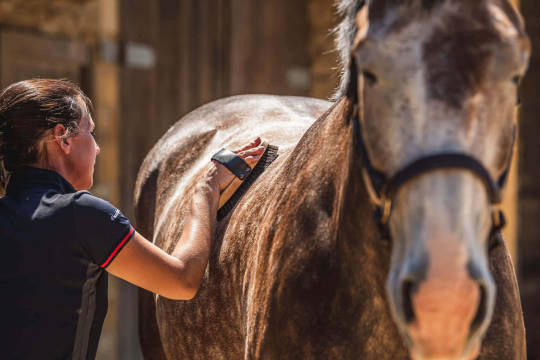
^ Racehorse Groom Stephanie Searle grooms a racehorse.
Floaters/Equine Dentists
Horses are unique animals, with unique digestive systems, as has already been discussed, and with unique teeth. Due to horses' diets involving primarily hays, grasses, or grains, the teeth of a horse receive a great deal of wear from the tough nature of these foods. The wear patterns are so well documented that they have for thousands of years been used to tell the age of a horse with a great deal of accuracy.

Floaters are equine teeth experts, and receive their name from the practice of 'floating', or grinding sharp areas of horses' teeth down to prevent these sharp points from slicing into the horse's cheeks or stopping a horse from properly chewing.
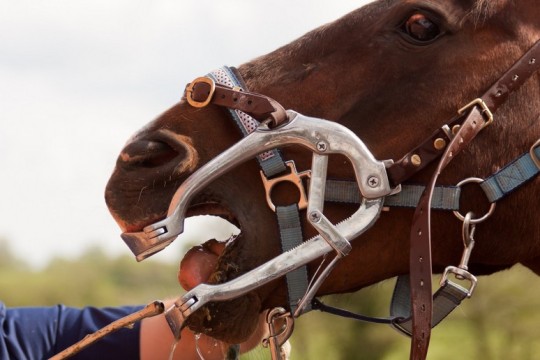
^ Floating a horse's teeth. Also not painful, but like many people, horses tend to prefer being sedated for the dentist.
Professional Transport
In the modern age, as well as to a certain extent, the past, horses are constantly being moved, shown, sold, and shipped. Professional horse transport exists in the form of semi-trucks, ships, and planes, as well as trains. The transport of horses, usually very expensive and valuable horses, requires a team of professionals including veterinarians to ensure the horses' safety in transition.
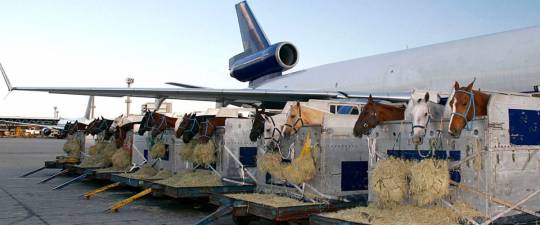
^ Horses ready to go on a plane. Personally, a terrifying sight.
Alternative Treatments
Just like human medicine, horse medicine has a proliferation of supplements, alternative treatments, folk magic, and home treatments. Professional equine nutritionists work with feed companies as well as feed supplement companies (think herbal food additives as well as fish oil, ect.) to create supplement brands that claim to calm or energize horses, ease pain, prevent colic, or treat any number of issues. Horses may receive any number of visits from such varied services as equine massage therapists, equine physical therapists, equine chiropractors, equine spirit mediums, animal communicators, and so on. The scientific basis for these professionals ranges from well supported to lacking support, but such services remain popular regardless.
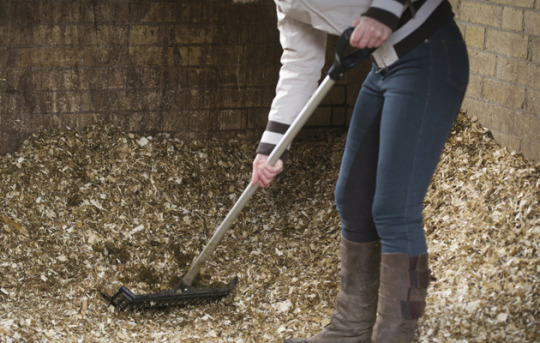
^ No matter what the profession with horses ends up being, just about everyone starts here: mucking out the stalls.
This post will end here, but keep an eye for the extended cut with the English and Western specific professions!
#writing horses#writing advice#how to write horses#basic horse writing advice#long post#writer advice#writeblr#writeblr community#writing tips#creative writing#writer stuff#basic horse things#so you want to write about horses#writers community#equine writing advice#writing equine professions#writing equestrians
39 notes
·
View notes
Note
I'm happy to hear the surgery went well! I'm not sure if you've talked about it before (I only started following recently) but I was wondering what made you decide to become a vet?
AWWW hi there, that’s kind of you to say!! god, i’ve wanted to be a vet since i was like… probably six or seven years old?? as soon as i found out that horse ranching is no longer a viable career option in the 21st century 😂
it was def spurred on by my love of animals. here’s some deep aqua lore: i was a Horse Girl for my entire childhood and even took riding lessons at one point. but funnily enough, i’m not actually going into equine medicine (at least not right away). these days i’m solidly in the Cat Person camp and going into small animal practice, potentially ER (i’ve got an externship this summer that’ll let me know if that’s the right choice or not HAH).
ofc, love of animals alone isn’t always enough to base a career off of. i’ve taken a lot of steps thru highschool and undergrad to make sure this is the field for me, cuz it’s a LOT of biology and physiology and anatomy (which turned out to be a surprise love of mine). and even though there are specialists out there for just about everything, the average general practice veterinarian has to be a jack of all trades; a clinician, a surgeon, a radiologist, an internist, a behaviorist, a nutritionist, the list goes on- and usually for multiple species that can have DRASTICALLY different biology! that’s daunting, sure, but also really exciting.
i love vet med because it’s a job that involves lifelong learning (and not just by doing required CE credits) and it has nearly infinite possibilities. i can go into virtually any aspect of the field the day i graduate, with no additional schooling required except for a residency or rotating internship. and there’s so much freedom if i decide to switch gears later on! i have professors who have moved to different disciplines three or four times. there’s also great opportunity for teaching and mentorship, which i’ve also discovered i enjoy, without having to have any kind of degree in education because it’s all clinical-based. i’m already thinking that i might pursue some kind of teaching position when i’m old and i’ve had my fun actually practicing medicine 😂
anyway that was prob more in-depth than it needed to be, but HOT DOG i’m excited!! having our first surgeries this week made it all feel that much more real, rather than a classroom theoretical, and it’s always great to have reassurance that i’m def where i want to be.
#personal#thanks for the chance to ramble LOL#i tend to keep my professional life and personal life pretty separate but it’s nice to talk about this stuff!
25 notes
·
View notes
Note
Tell us about horse twins
Hahaha thanks for asking and also I’m sorry in advance! I learned this “fun” fact from my wife, who works in veterinary medicine. Disclaimer: I am not a vet, and I don’t work with horses.
So long story short, horses cannot have twins. But sometimes, a mare ends up pregnant with twins, anyway. This is always dangerous for the mare, and the twins almost always die. These days, it is widely held in veterinary medicine that the best practice is to abort one of the twins and save the other. Modern ultrasound technology can help vets and horse breeders to catch problems early, and there are some fairy non-invasive ways to abort while the foals are still in a sort of early embryonic stage, often even before the embryo has implanted . Because horse breeding is highly planned, it’s pretty normal to catch this sort of issue less than two weeks into gestation.
HOWEVER, if for whatever reason you don’t catch the twin issue early enough… the best option left to the vet is cranio-cervical dislocation. Which is exactly what it sounds like! The vet sticks their hand in the horse, either transabdominally or transrectally, and breaks one of the foal’s necks 🙃
Somehow I got it into my head that this would be a good subject for a one shot fic LMAO, so that’s linked below. There’s a line in the fic that is directly inspired by a conversation with my wife’s boss— apparently when he was in vet school, his professor explained how to choose between the twin fetuses as follows: “whichever one is slower.”
Which is sad but also I mean. It’s a little hilarious.
I’ll also link a little article on equine twin reduction.
Now you know! My condolences ❤️
#I feel like this needs a trigger warning but idk for what lmao#animal death#?#anyway thanks for the ask Danny#and also sorry lolololol
2 notes
·
View notes
Text
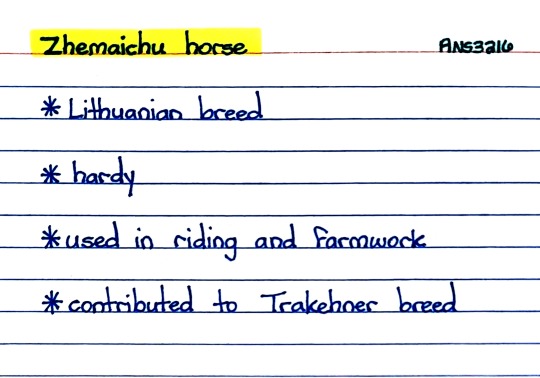
Patreon
#studyblr#notes#my notes#animal science#equine science#equines#horses#animal sci#science#biology#bio#vetblr#veterinary science#vet sci#vetsci#vet science#vetmed#veterinary medicine#vet med#vet medicine#horse biology#horse breeds#breeds of horses#domestication#biology of horses#life science#biological science#note cards#flashcards#flash cards
3 notes
·
View notes
Text

A novice witch, Jeanie loves her garden and collection of stuffed animals...but she's the world's biggest klutz. She is balancing a receptionist's job at a law firm and veterinary school, specializing in equine medicine. Jeanie has loved horses since childhood, but an unfortunate accident left her unable to ride for years. Now interning as a student vet at a horse ranch, Jeanie is getting hands-on experience caring for the creatures she loves the most... and the hunky horse trainer is a bonus.
Young Adult, Spellcaster
Aspiration: Spellcraft and Sorcery
Traits: Horse Lover, Loves the Outdoors, Clumsy
No CC
Jeanette Fishman
2 notes
·
View notes
Text
So… I’m not even sure I’ll have something to share, worthing to publish the whole NewTina AU story on AO3 one day. But I had a lot of fun to write the mentor/mentee relationship between Albus and Newt.
Modern AU, non magical
Newt is Albus’ employee, both are vets in Scotland.

As usual, it's a very raw translation from French, and unedited. Sorry
“First stop, Mitchell family ?” asked Albus, breaking the silence that had settled between them, while the inside of the car was soothed by the muffled sound of a radiophonic diffusion of a musical piece played by a symphony orchestra.
“Humhum” approved Newt, before resuming. “One of his horses is limping”.
“So… imagine, you have to deal with the case. What do you think, Doctor ?”
Newt took some time to consider it . If he loved horses, and was experimented in their care, he had never really practiced equine medicine, and it impacted his self-confidence. “Hum… I don’t know ?”
“Try anyway. No judgment here.”
“Hum… it would depend on how he’s limping, I suppose ?”
“Indeed. What would you do ?”
“I would look at him as he walks, and trots. In order to determine what leg it is, and the level on the leg. I would search for some swelling, abnormal heat, some pain at the palpation, maybe a foreign body, or some parasites or others pathogens responsible of things like mud fever, some whole body conditions that can result in lameness like piroplasmosis even if this area and with this cold it’s unlikely…”
“Good. Aren’t you forgetting something ?”
Silence fell inside the vehicle, the music still as a background noise, accompanied by the whirring of the engine and the squeaking of the windscreen wipers that made the young man periodically wince. This bloody creaking cut off the thread of his thoughts, of the movie of all the consultations on the subject he had witnessed before, and that he now tried to play again in his head. He secretly hoped that Albus would finally give him the answer, as his focus was disturbed, which was, of course, worse during the consultations when the animals’ guardians couldn’t help but speak to him non stop. Instead of a relieving answer, Albus stopped the radio and the windscreen wipers, waiting for the fruit of his mentee’s reflection. The film of the passed consultations restarted inside Newt’s mind almost in the instant.
“Take the hoof, check the frog, test for some abscesses with the pliers …?” he finally answered, uncertain.
“You see ! You are completely able to do a horse lameness consult !”
“But if it’s muscular, or tendinous, or …”
“If you don’t know, you can send the case to someone else. This isn’t a shame to refer the cases that are too complicated for you. Especially in equine medicine, that you practice only when you are on call. But you know and master a great deal more than you want to think. Try to remember that young padawan. You’ll always need to learn new things, of course, that’s life and the core of our job. But your value is a lot greater than you believe. You have to acknowledge that, Newt.”
A smile creaked on Newt’s face, against his own will. He enjoyed these one to one discussions and exchanges, when he learnt so much. Albus kept going with the differential diagnoses, making him contribute as much as possible to the reflexion process. From time to time, Newt took some notes on his phone, sure that he wouldn’t be able to memorize so much auditive information, these precious pieces of knowledge that would probably be vital for him in the future.

#fantastic beasts#newt scamander#albus dumbledore#dumbledore#fan fiction#animals#fantastic beasts fanfiction#This one is free therapy for me#I actually identify some traumas#oupsy
7 notes
·
View notes
Note
What's your favorite vet school class? And what kind of animals get covered? Just (common) pets? Or both livestock and pets? Or also exotic pets?
So in veterinary school, the primary academic focus is small animal (cats and dogs) and large animal (equine, bovine, etc.), so your mandatory classes tend to focus on these species. However, you can take electives like avian medicine, lab animal medicine, aquatic medicine, etc,. But this can really depend on what school you attend, as some do not offer any exotic medicine opportunities or might be more large animal focused.
And then for your clinical year you can tinker with your rotations a bit to choose ones that deal with the animals you’re interested in, like exotics.
But you will have to learn small and large animal medicine as a baseline, particularly canine, feline, and equine. So even if you have no interest in equine medicine, you’re still gonna have to take and pass large animal surgery or do quite a few large animal based rotations your clinical year!
My favorite class right now is Physiology and Principles of Infectious Disease! These classes focus mainly on dogs, cats, and horses but will present examples of other species or teach us species exceptions to certain rules. My least favorite class is General Anatomy, because it’s just soooo much info and incredibly intense.
3 notes
·
View notes
Note
Might seem like a weird question but do you think it's wrong for a vet to specialize in a single species? I told a friend I wanted to specialize in cats and they called me rude for "not thinking about all the other small animals" :/
Not at all! This is a hot topic for me, so prepare for a long reply ;)
For context: A veterinarian can work on multiple species (everything, mixed small & exotics, mixed small & large, mixed equine & livestock, etc.), single species (equine only, dairy cow only, feline only etc.), industry (FDA, research, agriculture, department of health, etc.), a single specialty (neurology, soft tissue surgery, emergency medicine, cardiology, internal medicine, radiology, etc.), or they can do some blend over their life time. There's a million ways to work with a DVM. Some people specialize in one species or field and some don't.
The reason people specialize is because they are more comfortable or confident in one species versus another, or they have a strong interest in that species or field. That makes them better at the job they want to do in our field. They have decided to fill a particular need and be the best they can in that aspect of veterinary medicine.
I wouldn't see a small animal GP for my horses and vice versa. In the same way, cats are complicated. If you can become an excellent doctor working on cats and really developing your knowledge in that area? You are an asset to cat owners everywhere.
Along those lines: What about doctors who go on to specialize in neurology or surgery? What about the doctor who decides to specialize in large animal medicine instead of totally mixed practice?
Personally, I'm planning on working almost exclusively on horses with some small ruminant. I like cats, but dogs scare me. What good does it do for me to work on a species that declines my health to be with everyday? I have the potential to be an excellent equine doctor, but if someone told me I was required to work on dogs because I had to think of all of the species? I wouldn't enjoy my work and I wouldn't be as effective as a doctor. I'm better at equine medicine than I am at canine medicine. I know this, so I'm planning to work where I excel and can do best by people and their animals.
We learn a lot about diversifying our interests and keeping our options open in school, and I would recommend doing that. You never know if your mind will change, and having the basics to go off of for the major species is good to have. It will especially help for taking the NAVLE in fourth year. A broad basis will make you a better doctor in the long run outside of school just because it gives you more knowledge to work with.
But that being said, play to your strengths. If you love cats and want to work on them? Do that. If I love horses and want to be an equine practioner? Then that's what I should do. This profession is full of options and directions and niches. You will serve animals just as well in one place as another so long as you do work that fulfills you. There's a need for veterinarians everywhere, there's aspects of every species that are hard, and there's nothing wrong with picking one and getting really good at it.
Only you can decide what it is about veterinary medicine that fulfills your calling. We're all made different for a reason. Pigeon holing ourselves into someone else's idea of what it means to be a veterinarian will only ever make us upset and uncomfortable in our own lives. I'd rather be in this profession for 40 years than burn-out after 4, you know?
If you want to be a feline only vet and strive for excellence in that area? Go for it! You will not be any less of a doctor, I promise.
#veterinary medicine#veterinarian#vetblr#feline medicine#specialist medicine#vet med#asks#me on my soap box
81 notes
·
View notes